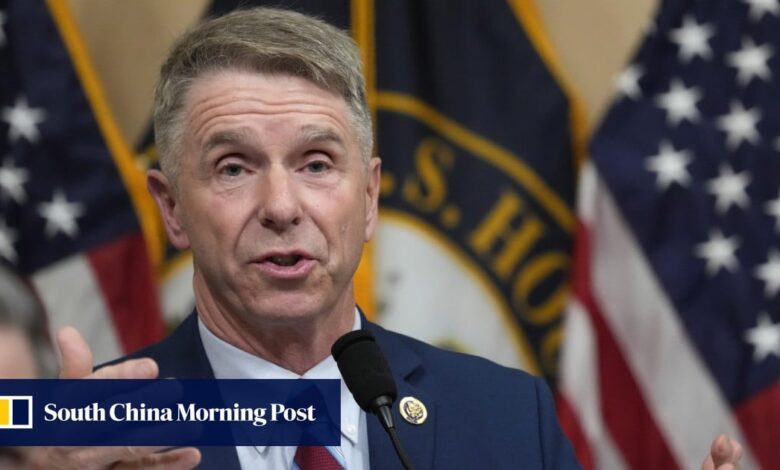US intensifies scrutiny of China’s bid to hold sway over domestic policy in ‘threat of our lifetime’

[ad_1]
The Senate Select Committee on Intelligence on Wednesday took up Beijing’s influence operations and alleged transnational repression. The hearing addressed the need to update the Foreign Agent Registration Act (FARA), a federal law from 1938 that monitors overseas lobbyists.
In addition, Washington’s lawmakers were considering new laws targeting anyone involved in efforts to intimidate members of America’s Chinese community or other Beijing critics.
Alan Kohler, formerly with the FBI’s counter-intelligence division, told the committee that China-related investigations now make up about half of all counter-intelligence work, accounting for “well over 2,000 active investigations, which is equal to the threat from all other countries combined”.
“The Chinese government has found subnational level influence to be a successful tool in their effort to manipulate the environment to their advantage,” said Kohler, now president of Pamir Consulting, a private firm counselling companies investing in China.
“Subnational leaders are often more focused on things such as job creation, capital, investment and cultural exchanges, and less attuned to the methods of Chinese political influence operations,” he added.
Buying US farmland not part of China agriculture plan, panel told
Buying US farmland not part of China agriculture plan, panel told
Glenn Tiffert of the Hoover Institution, an American think tank, backed up Kohler’s assessment.
“We have a really unequal, unlevel playing field in their engagements with the subnational level, simply because they have a vast apparatus whose job it is to collect information on every elected official at the state and local level that they plan to engage with,” Tiffert testified.
“We are completely outgunned when they meet with our local elected officials and our business leaders. They have fully briefed dossiers on all of them, and frankly, our side has very little,” he added.
Kohler said task forces within the FBI and the Office of the Director of National Intelligence should be bolstered to monitor Chinese engagements with state and local government officials. He believed the US needed laws that specifically target China’s alleged efforts to silence critics in the country.
He believed the US needed laws that specifically target China’s alleged efforts to silence critics in the country.
The issue of unregistered Chinese police outposts in the US came up repeatedly in the Senate hearing.
Senator Angus King of Maine, who is a political independent, asked each witness to give the committee suggestions for strengthening FARA to combat China’s efforts to influence subnational US governments, be they “greater enforcement” or “more substantive content”.
Senator John Cornyn, a Texas Republican, said Congress should address “commercial lobbying loopholes” that he accused China of using to influence US lawmakers on all levels.
‘Nowhere to hide’: China says spyware analysis revealed US NSA operatives
‘Nowhere to hide’: China says spyware analysis revealed US NSA operatives
Beijing hopes to “weaken” the US by influencing officials throughout the American government, according to US Republican congressman Rob Wittman of Virginia, vice-chairman of the House Armed Services Committee, speaking at a different event.
“China’s intent is to indeed weaken the United States … I think we folks in elected positions across the United States executive branch and legislative branch, need to call this out for what it is,” Wittman said during a panel discussion on Thursday at the Centre for Strategic and International Studies, a Washington think tank.
“This is the threat of our lifetime.”
Wittman said Chinese present in the US “actively going after Chinese dissidents is the tip of the iceberg” and called for greater efforts to identify those individuals coming into America.

Spotlighting Beijing’s influence operations overseas, the GEC in its report said the Chinese government maintained 333 diplomatic and official media accounts with the number of followers totalling nearly 65 million combined.
“Networks of bots routinely amplify diplomats’ posts, in some cases exclusively engaging with diplomats posted in a specific country,” the report stated.
“The more significant the competition arises with the United States, the Chinese government has sought to provide [narratives favourable to China],” said James Rubin, the GEC’s special envoy and coordinator, in a briefing about the report on Thursday.
US Republican lawmakers urge Biden to crack down on Huawei, SMIC
US Republican lawmakers urge Biden to crack down on Huawei, SMIC
Meanwhile, a hearing by the Senate Committee on Energy and Natural Resources on Thursday raised the alarm on US vulnerability to China in another area: critical minerals.
The senators and industry witnesses touched upon several recurring themes: a lack of foresight; long lead times to approve new US mines; companies sitting on permits for decades without developing mines; and Beijing’s considerable leverage over Washington given its large critical-mineral head start.
US raises alarm as Chinese platform corners global shipping logistics market
US raises alarm as Chinese platform corners global shipping logistics market
Since then, Japan has cut its dependence on Chinese-produced lithium, although it still sources most of it from China, underscoring the difficulty in shifting supply chains quickly.
Daniel Yergin of S&P Global and author of a seminal Pulitzer Prize-winning book on the history of the oil industry, said transitions to new energy sources generally take a century, but the world was now trying to do that in 25 years.
In California, a lithium gold rush at the edge of a dying sea
In California, a lithium gold rush at the edge of a dying sea
This comes as EV sales, a priority for China’s planned economy, skyrocketed globally from 716,000 in 2015 to 10.6 million last year.
“China has been at the forefront of this growth, accounting for 60 per cent of the new EV registrations worldwide in 2022,” according to the report.
“The urgency is clearly there. We recognise that,” said Senator Lisa Murkowski, an Alaska Republican, on Thursday. “And yet we’re not moving the needle.”
[ad_2]
Source link





